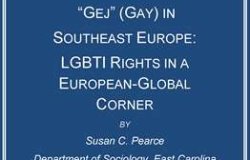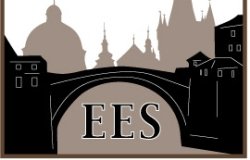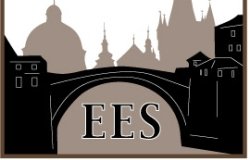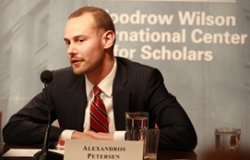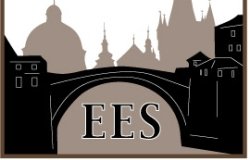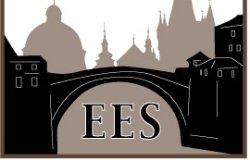Making Turkey Safe for Democracy? A Discussion on Turkey's New Constitutional Crisis
with Hakan Yavuz , Associate Professor of Political Science at the University of Utah and Mario Zucconi , Senior Fellow, the Italian Social Sciences Council in Rome and Public Policy Scholar at the Woodrow Wilson Center
Overview
On Tuesday, May 13th the West European Studies Program along with the Middle East Program and Southeast Europe Project hosted Hakan Yavuz, Associate Professor of Political Science at the University of Utah and Mario Zucconi, Public Policy Scholar at the Woodrow Wilson Center for a discussion on the new constitutional crisis in Turkey.
Hakan Yavuz began the discussion by explaining the meaning of the state from a Turkish point of view. First he noted, "the state of Turkey existed prior to the nation's constitutional order." Additionally, the idea of the Turkish state has been above the idea of a Turkish society and the concept of the state has traditionally excluded political parties. Indeed, given the extreme diversity of Turkey in political, religious and ethnic terms, Yavuz explained that the state had to be considered above the society.
Yavuz elaborated on the principle features that make the Turkish context so different from the other Middle Eastern and Islamic countries. Turkish Islam is characterized by a strong Sufist influence and by the existence of a contested zone between orthodoxy and heterodoxy. Contrary to the Gulf countries, Turkey is not an oil based economy, its tax-based economic model is therefore more closely related to that of Malaysia. As Turkey was never colonized, it is more comfortable in its interaction with the Western world than a number of Islamic countries. Additionally, Yavuz explained how the military was the first institution to modernize itself in the Ottoman Empire, and this institution has served as a vector of the Turkish modernization project. The movement of reaction to reforms was driven by Islamic groups. Therefore, Islam represented at this time a source of identity and an alternative view of modernity and polity. This period is known as the Kemalist era.
Turkey is also characterized by the multiparty system that emerged in the 1950s through a combination of internal and external pressure. The 1961 Constitution established a Constitutional Court with the purpose of protecting secularism and the nation-state as well as to protect the state from the society. A change in the meaning of religion occurred in the 1980s, when a new conception of modernization emerged and, contrary to the Kemalist period, excluded Islam,
Yavuz then elaborated on the Justice and Development Party, known as the AKP. He argued that it is a conservative party that has no specific ideology, as it is a coalition composed of Islamic groups and Kurds among others. It has two main goals: the enhancement of democracy and the stability of a neo-liberal market economy. It is therefore willing to join the European Union, as it upholds civil liberties and it represents a larger market. But Yavuz also noted that the AKP is not a secular party, as it is shaped by an Islamic terminology and lifestyle, in particular in its stance on gender issues. However, this reference to religion is not at the core of the AKP's platform. Indeed, religion is reduced to ritual activities and symbols such as the recent reinstitution of the head scarf.
Yavuz concluded that, for the AKP it is the global economic market, and not Islam, that should serve as a model for policy and that could bring a solution to the problems of Turkey. Yavuz therefore argues that the AKP is a party without identity. He contends that at the surface, Turkey seems to be heavily marked by Islamism, but when we take a closer look, it is more of a secular country. Because of the importance of the AKP, Turkey is more conservative than five years ago. For Yavuz, the AKP has committed several mistakes in the past years, among which the election of Abdullah Gul as President, the Islamization of the educational system and the police forces, the lifting of the ban on headscarves in Turkish universities and the ban on alcohol at the municipal level. These steps created a widespread fear among the secular establishment. Against this backdrop, Yavuz summarized that it is difficult to combine democracy with the traditional notion of state in the Turkish sense. He expressed the hope that the process of evolution would lead over several decades to a viable compromise between state and society.
Mario Zucconi started his presentation by expressing his worries about the current crisis in Turkey, which he argues is more serious than the previous one provoked by the military one year ago.
Turkey's politics are polarized because of the gap between secularism and Islamism. The Jacobin era of Turkish politics had extracted the country from the Middle East. However, with the rise of democracy in the 1950s, religion recovered its relevance in Turkish politics, and became a central political factor in the 1990's. The weight of religion is now so important that it cannot be pushed back. Moreover, the re-emergence of Islam has led to the reintegration of Turkey in the political and cultural context of the Middle East. Turkish politics is now marked by the clash between a social-political block identified with the Justice and Development Party and the secular establishment, which is unwilling to surrender its power, constituting a form of "secular authoritarianism" according to Zucconi.
EU membership was a core issue during the 2002 elections, which saw the JDP gather a high number of votes. Zucconi explained that the European Union is currently important for this party because it provides a new normative political and cultural context. Additionally, it is the most important factor which gives the party credentials for modernization, and, more basically, legitimacy. However, a party with an Islamic background can only be accepted if it works within the pattern of the EU institutional framework. Besides, Zucconi argued that most of the military has now accepted the fact that the modernization of Turkey is associated with the prospect for EU membership.
Therefore, Zucconi concluded that Turkey still displays a strong interest in joining the European Union. This is especially the case when looking at the business community, which considers EU membership a key factor in providing the country with credibility and thus make it attractive for foreign direct investments. European Union membership would also decrease Turkey's feeling of isolation internationally, according to Zucconi. However, among Turkish political elites, some still stress the need for a new Constitution, contending that the current one is not suited for accession to the EU.
During the question period Yavuz argued that since 2004, the sustained reform drive by Turkey to obtain EU membership has played a very negative role in the country. He warned that if it is not followed by accession, this process might lead to the collapse of the state in the next few decades. Indeed, Yavuz insisted that Turkey is not a Western style democracy in the sense of Great Britain or the United States but has been characterized historically by its communitarian nature. Against this backdrop, Yavuz noted that if the state looses its legitimacy, we might witness the balkanization of the country.
Zucconi followed up by deploring the attitude of the EU towards Turkey, as the former does not sufficiently acknowledge the latter's will to transform itself. He argued that it is easy politically to consider Turkey as expendable because of the Cyprus issue and the hostility by some in the European public towards the nation. This is strengthened by the negative image of Islam that prevails since the recent bombings in London and Madrid and the riots in Paris, the EU's poor economic performance in the last years, its enlargement fatigue since 2005, and the leadership of Angela Merkel and Nicolas Sarkozy. Given the fact that the relationship of the West with the Muslim world is one of today's most pressing issues, Zucconi noted that this is very unfortunate. Indeed, Zucconi stated that Turkey is a "Muslim-Western country" that could play the role of a indispensable bridge between the Western and the Muslim worlds in the 21st century.
Hosted By

Global Europe Program
The Global Europe Program is focused on Europe’s capabilities, and how it engages on critical global issues. We investigate European approaches to critical global issues. We examine Europe’s relations with Russia and Eurasia, China and the Indo-Pacific, the Middle East and Africa. Our initiatives include “Ukraine in Europe” – an examination of what it will take to make Ukraine’s European future a reality. But we also examine the role of NATO, the European Union and the OSCE, Europe’s energy security, transatlantic trade disputes, and challenges to democracy. The Global Europe Program’s staff, scholars-in-residence, and Global Fellows participate in seminars, policy study groups, and international conferences to provide analytical recommendations to policy makers and the media. Read more

Middle East Program
The Wilson Center’s Middle East Program serves as a crucial resource for the policymaking community and beyond, providing analyses and research that helps inform US foreign policymaking, stimulates public debate, and expands knowledge about issues in the wider Middle East and North Africa (MENA) region. Read more
Thank you for your interest in this event. Please send any feedback or questions to our Events staff.
